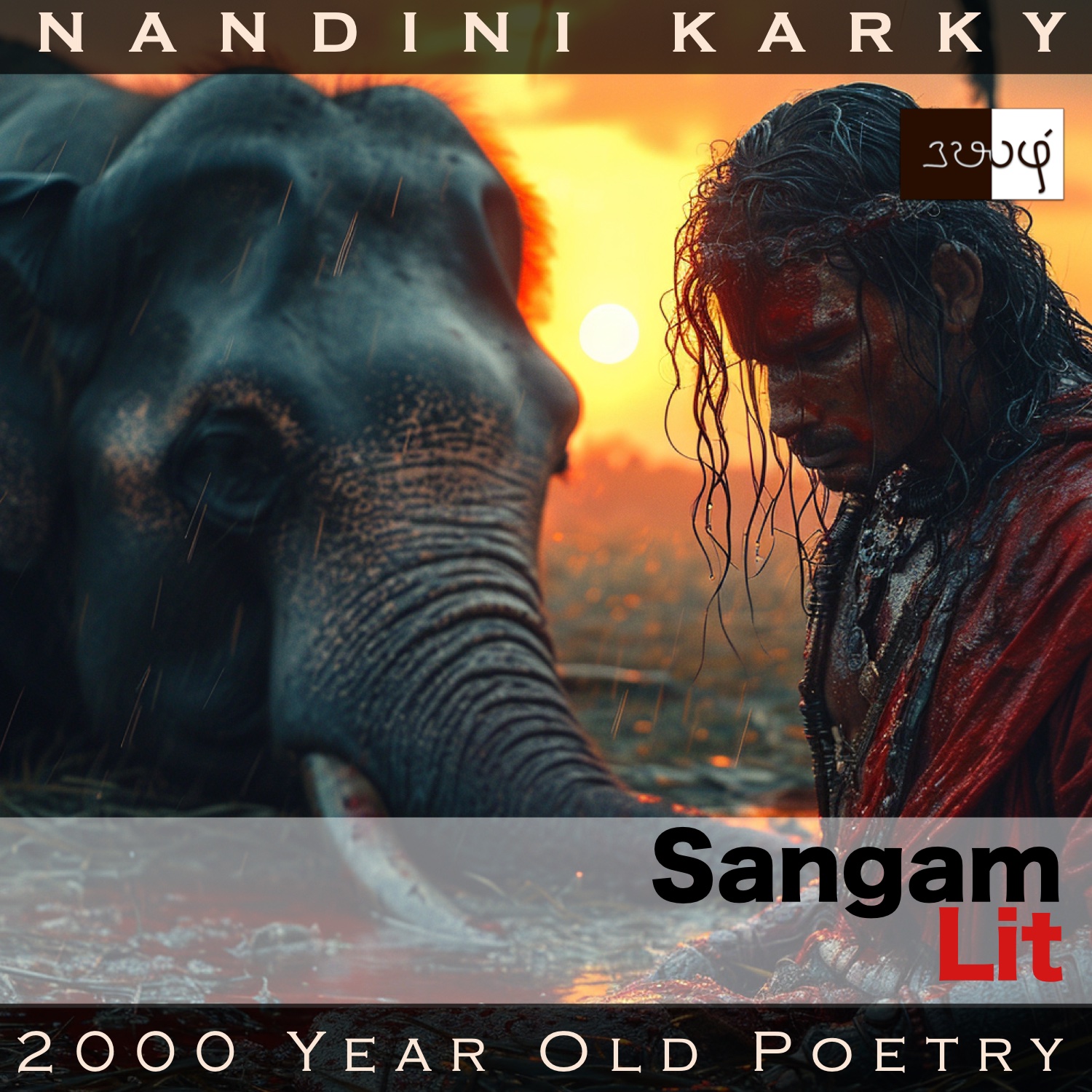Podcast: Play in new window | Download
Subscribe: Apple Podcasts | Spotify | Amazon Music | Android | iHeartRadio | Email | TuneIn | RSS | More
In this episode, we perceive what was considered a valorous action in the battlefield, as depicted in Sangam Literary work, Puranaanooru 307, penned by an anonymous poet. Set in the category of ‘Thumbai Thinai’ or ‘Battle of two kings’, the verse sketches the search for a fallen warrior and the events that unfolded.

ஆசு ஆகு எந்தை யாண்டு உளன்கொல்லோ?
குன்றத்து அன்ன களிற்றொடு பட்டோன்;
வம்பலன் போலத் தோன்றும்; உதுக்காண்;
வேனல் வரி அணில் வாலத்து அன்ன,
கான ஊகின் கழன்று உகு முது வீ
அரியல் வான் குழல் சுரியல் தங்க,
நீரும் புல்லும் ஈயாது, உமணர்
யாரும் இல் ஒரு சிறை முடத்தொடு துறந்த
வாழா வான் பகடு ஏய்ப்ப, தெறுவர்
பேர் உயிர் கொள்ளும் மாதோ; அது கண்டு,
வெஞ் சின யானை வேந்தனும், ‘இக் களத்து,
எஞ்சலின் சிறந்தது பிறிது ஒன்று இல்’ என,
பண் கொளற்கு அருமை நோக்கி,
நெஞ்சு அற வீழ்ந்த புரைமையோனே.
A song filled with layered similes, which we shall unravel shortly. The poet’s words can be translated as follows:
“A pillar, my lord was! Where could he be now? He was one, who has died felling a hill-like elephant. He appears like a stranger now. Look thither, akin to a squirrel’s tail in summer, stands the bristly needle grass in the scrub jungle, and the old and withered flowers of this grass has flown away and rested in heaps on his abundant, wavy hair. Akin to a huge, crippled bull, abandoned in an uninhabited place by salt merchants without leaving it a stock of water and grass, he ended the lives of enemies any he encountered in his path! Seeing the greatness of this man who fell with such fame, and seeing that it was worthy of bards to be sung, even the king, the possessor of furious battle elephants, thought, ‘There is nothing more worthy than dying in this battlefield’, and so, without love for his life, he fought and fell thither!”
Time to delve into the layers within. The poet starts by speaking in the voice of a person praising a soldier as their rock and pillar, wondering where he could be? Then, this person points to a particular soldier, who has died in the process of fighting and killing an elephant, and wonders if he could be that soldier he was talking about. There’s a hesitation because in the process of fighting with the battle elephant, the person seems to have become disfigured and now looks like someone else. Suddenly from the battlefield, this person travels far and talks about a squirrel and that too a squirrel’s tail in the summer season, dry and rough. This is to call in parallel the flowers of the ‘ookam grass’ or aptly named ‘bristly needle grass’, which have fallen, and has now gathered in heaps on the curly and abundant hair of that fallen soldier. So, we understand the person is still talking about the dead warrior who felled an elephant.
Once again, moving elsewhere from the scene of the battle, the person’s voice now talks about a crippled bull abandoned by salt merchants. We have seen in other Sangam poems how these nomadic traders take salt from the coastal regions and travel to the agricultural regions and keep the trade and commerce flourishing in that age. They always journey with their kith and kin in huge groups on their bullock carts. In their journey, sometimes a bull may develop an injury and might cause trouble for the travellers, who have to keep moving. In that case, they would abandon the bull and go their way. Now, what would this bull do without food and water? It would eat whatever it finds on the way, caring not if it’s edible or not, anything to survive. This action of the bull is placed as a simile to that warrior’s actions, who slashed all his enemies left and right and devoured their lives. Seeing these actions of the soldier and looking at how worthy it was to be sung by poets, even the king thought there was no better honour than to die on this battlefield, and the monarch did just that, inspired by the fallen soldier, the poet concludes!
Thus, we find this is a paean to the courage of that soldier, who died felling a battle elephant. Even though he lives no more, according to the poets he has triumphed death through his actions. And in yet another Sangam verse, we find that it’s not the winners or those who live to tell the tale that matter to these Sangam folks. Another striking aspect is that it matters not if one was a king or a mere soldier… what glorifies a person is only how they stand with courage and give their all. Our battlefields are vastly different from these stages of blood and war but nevertheless the honour of fighting till the end lives on timelessly!




Share your thoughts...